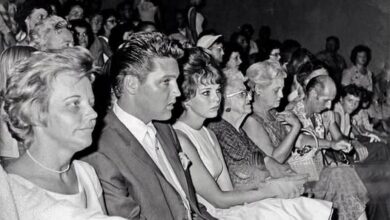Freda Payne’s “Band of Gold” Redefines Heartache and Triumphs as a Soul-Pop Classic in 1970
When Freda Payne released Band of Gold in 1970, it became an instant sensation, blending emotional depth with a danceable groove in a way that few songs had done before. A soul classic wrapped in a pop package, the song’s heartbreaking lyrics contrasted with its upbeat Motown-inspired production, creating a paradox that captivated listeners. It shot to No. 3 on the Billboard Hot 100 and topped the UK Singles Chart, cementing its place as one of the most memorable breakup songs of all time. With its enigmatic storytelling and powerful vocal delivery, Band of Gold transcended generations, remaining an enduring favorite in the worlds of soul, pop, and R&B.
Freda Payne, a Detroit native, had spent much of the 1960s working as a jazz and R&B singer, gaining respect in the industry but struggling to find mainstream success. She had recorded with various labels, worked as a session singer, and even turned down a contract offer from Motown in the early part of the decade. However, her fortunes changed when she signed with Invictus Records, a label founded by former Motown hitmakers Holland-Dozier-Holland. The legendary songwriting and production trio saw in Payne a unique voice that could carry a song with both elegance and raw emotion, and Band of Gold was their golden ticket to success.
The song’s lyrics tell the story of a newlywed woman left in heartbreak after her husband refuses to consummate their marriage. Written by Holland-Dozier-Holland under pseudonyms (due to legal disputes with Motown at the time), along with lyricist Ron Dunbar, the song was originally meant to be sung from the perspective of a much younger woman. Some early versions even included lines that made it clear the protagonist was inexperienced in love, adding layers of mystery and depth. The ambiguous nature of the lyrics led to widespread speculation—was the husband uninterested, emotionally distant, or struggling with hidden issues? The unresolved nature of the story only added to the song’s intrigue and longevity.
The recording process at Invictus Records was as meticulous as it was inspired. Payne’s vocal performance struck the perfect balance between controlled elegance and emotional vulnerability, capturing the devastation in the lyrics without veering into melodrama. The instrumentation, driven by the Funk Brothers, who had been the backbone of countless Motown hits, provided a steady, infectious rhythm that contrasted with the sadness of the words. The song’s arrangement featured a dynamic use of strings, horns, and a driving bassline that gave it a hypnotic, almost danceable quality. This fusion of sorrow and groove became one of Band of Gold’s most distinctive elements.
Upon release, the song became an instant commercial and critical success. In the UK, it soared to No. 1 on the charts and remained there for six weeks, making it one of the biggest hits of the year. In the United States, it reached No. 3 on the Billboard Hot 100 and dominated R&B stations, becoming one of the most requested songs of the summer. Audiences were mesmerized by the paradox of a heartbreak ballad that made them want to dance. Meanwhile, Payne, who had spent years waiting for her big break, was suddenly catapulted into international stardom.
Beyond its chart performance, Band of Gold played a significant role in shifting perceptions of female-led soul music. While many songs of the era depicted women as either hopelessly devoted lovers or fierce, independent figures, Band of Gold presented a character caught in a moment of heartbreak and confusion. This vulnerable yet powerful portrayal resonated with listeners who saw their own struggles reflected in the song. Moreover, its success demonstrated that soul music could cross over into mainstream pop without losing its emotional depth.
For Freda Payne, the song’s success opened up new opportunities, from high-profile television appearances to worldwide tours. However, it also came with challenges—Payne found herself typecast as a heartbreak singer despite her versatility as an artist. Though she followed up with other hits, including Bring the Boys Home, Band of Gold remained the defining song of her career. Even as she ventured into acting and Broadway, it was the song that audiences continued to associate with her name.
The song’s influence extended beyond Freda Payne’s career, shaping the landscape of soul and pop music in the 1970s. The unique blend of orchestral soul, danceable rhythm, and emotional storytelling set a precedent for later artists, influencing both disco and contemporary R&B. Artists such as Gloria Gaynor and Donna Summer would build upon the template of bittersweet yet danceable soul, while even later pop divas like Whitney Houston and Beyoncé drew from the emotional power of Band of Gold’s storytelling.
Many artists have covered Band of Gold, each bringing their own interpretation to the song. In 1986, British pop singer Belinda Carlisle recorded a version that reintroduced the song to a new generation, adding a synth-driven arrangement suited to the era’s sound. In the world of R&B, legends like Kimberley Locke and Bonnie Tyler also paid tribute with their own renditions, proving the song’s lasting appeal. Despite these covers, Payne’s original recording remains the definitive version, its raw emotion and perfectly balanced production standing the test of time.
At the time of the song’s release, Freda Payne was experiencing a whirlwind of fame, but she also faced challenges behind the scenes. Legal battles between Holland-Dozier-Holland and Motown meant that she was often caught in contractual disputes. Despite these struggles, she continued to record and perform, proving that she was more than just a one-hit wonder. However, no matter where her career took her, Band of Gold remained an inescapable milestone in her journey.
Decades later, Band of Gold remains an essential classic in both pop and soul music. It continues to receive radio airplay, appears on countless “greatest hits” compilations, and is frequently referenced in films and television shows. The song’s lasting power comes from its ability to evoke deep emotion while maintaining a timeless, infectious melody. Whether played at a nostalgic gathering or discovered by new generations through streaming services, it never fails to leave an impression.
The song’s impact on music history is undeniable. It was one of the first tracks to successfully blend heartache with an irresistible groove, paving the way for future artists to experiment with emotional storytelling in upbeat songs. It also highlighted the potential for Black female artists to dominate both pop and R&B charts, breaking barriers for those who followed. Even today, Band of Gold remains a touchstone for any discussion on the evolution of soul music.
Ultimately, Band of Gold endures because it captures something universal—the pain of unfulfilled love, the confusion of a relationship that doesn’t go as planned, and the lingering hope that things might change. More than just a song, it is a moment frozen in time, a masterpiece that continues to captivate listeners over 50 years after its release. Freda Payne’s voice, filled with both sorrow and strength, ensures that the song will always be remembered as one of the greatest soul classics of all time.



